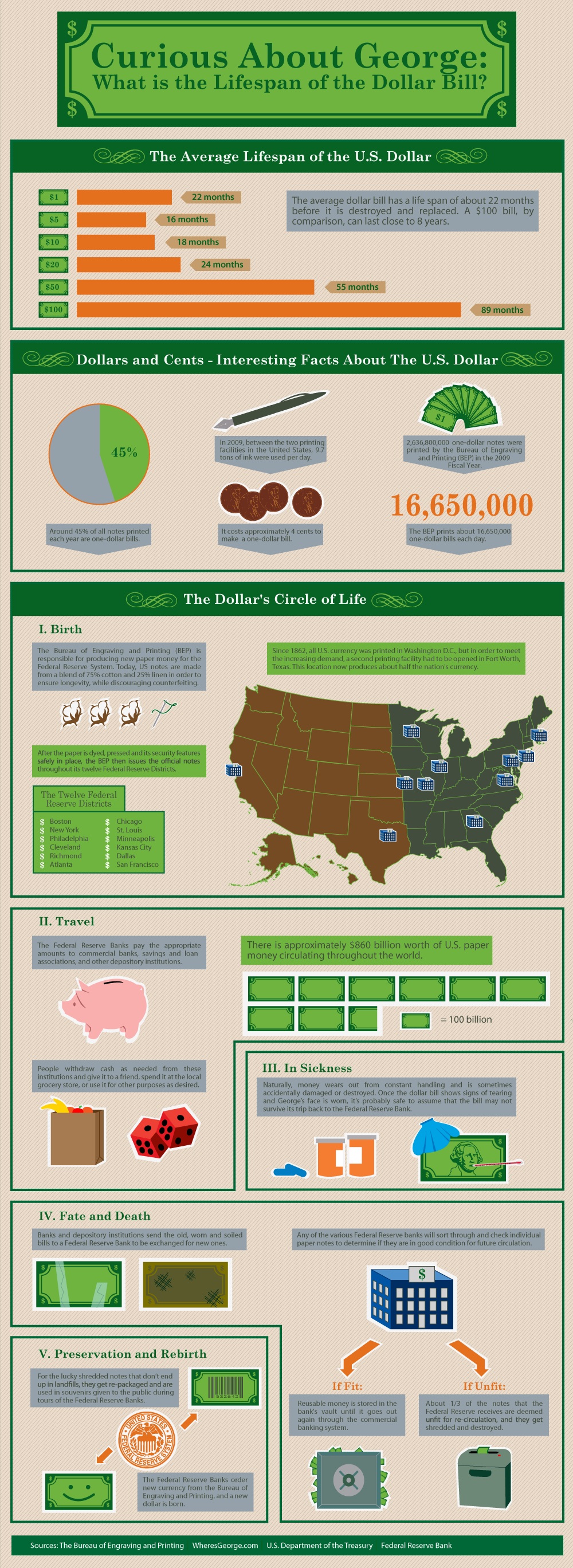The Life of a 'Printed' U.S. Dollar Bill

Federal Reserve Chairman Ben Bernanke confirmed on '60 Minutes' this weekend that QE2 may not be enough to save the economy, and QE3 could be coming down the pipe. On the show, Mr. Bernanke tried to dispel what he called a myth, saying the Fed is not printing money to buy the Treasury securities involved in QE2. This comment created quite a chuckle in the market today. While Bernanke & Co. are not creating physical money, they are creating money on a computer screen to buy these securities. Printing or not, these measures by the Fed are having a major impact on the 'printed' form of money. All you have to do is look at the price of gold to confirm this. Gold hit a new all-time high of around $1430 per ounce today.
With all the attention on 'printing' or 'not printing', we thought it would be interesting to take look at the curious lifespan of the U.S. dollar bill.
The average lifespan of a $1 bill is 22 months, before it is destroyed and replaced. The average lifespan of a $5 bill is 16 months. A $100 bill lasts the longest at 89 months, or nearly 8 years.
About 45 percent of all the notes printed each year are $1 bills, totaling 2.64 billion in 2009. It cost approximately 4 cents to make a $1 bill.
The U.S dollar is printed by the Bureau of Engraving and Printing in two facilities, one in Washington D.C. and the other in Fort Worth, Texas. It is made from a blend of 75 percent cotton and 25 percent linen.
The is approximately $860 billion worth of U.S. paper money circulating throughout the world.
Dollar bills are taken out of circulation by the Federal Reserve if they are determinate not to be in good condition. About 1/3 of the notes that the Federal Reserve receives are deemed unfit for re-circulation and are shredded and destroyed.
The following infographic from www.creditloan.com offers more curious facts about the U.S. dollar. Click here for a full size image.

With all the attention on 'printing' or 'not printing', we thought it would be interesting to take look at the curious lifespan of the U.S. dollar bill.
The average lifespan of a $1 bill is 22 months, before it is destroyed and replaced. The average lifespan of a $5 bill is 16 months. A $100 bill lasts the longest at 89 months, or nearly 8 years.
About 45 percent of all the notes printed each year are $1 bills, totaling 2.64 billion in 2009. It cost approximately 4 cents to make a $1 bill.
The U.S dollar is printed by the Bureau of Engraving and Printing in two facilities, one in Washington D.C. and the other in Fort Worth, Texas. It is made from a blend of 75 percent cotton and 25 percent linen.
The is approximately $860 billion worth of U.S. paper money circulating throughout the world.
Dollar bills are taken out of circulation by the Federal Reserve if they are determinate not to be in good condition. About 1/3 of the notes that the Federal Reserve receives are deemed unfit for re-circulation and are shredded and destroyed.
The following infographic from www.creditloan.com offers more curious facts about the U.S. dollar. Click here for a full size image.

You May Also Be Interested In
- Fisker (FSR) files form 10-K, sees more job cuts, reiterates going concern doubts
- Ancora Sends Important Letter to Fellow Shareholders About Our Collective Opportunity to Transform and Turn Around Norfolk Southern (NSC)
- Ancora Sends Important Letter to Fellow Shareholders on Norfolk Southern (NSC) Turnaround Plan
Create E-mail Alert Related Categories
Insiders' BlogRelated Entities
Ben S. BernankeSign up for StreetInsider Free!
Receive full access to all new and archived articles, unlimited portfolio tracking, e-mail alerts, custom newswires and RSS feeds - and more!



 Tweet
Tweet Share
Share